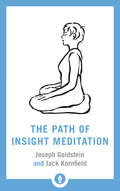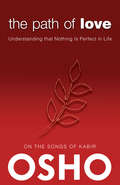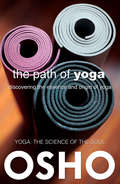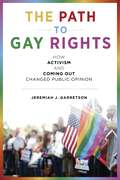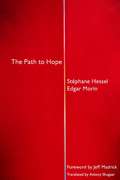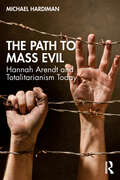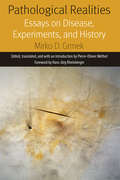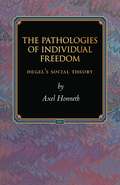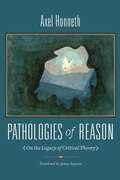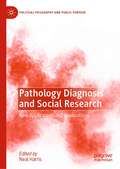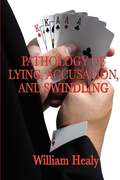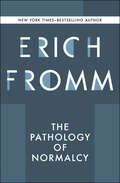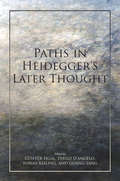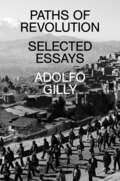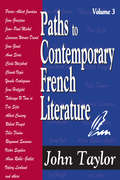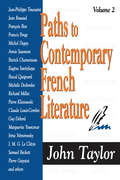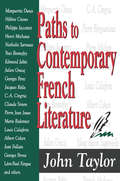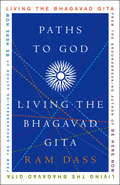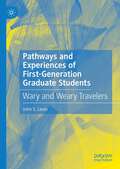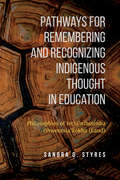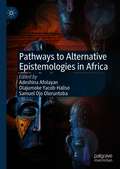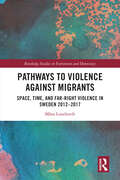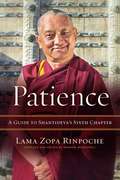- Table View
- List View
The Path of Insight Meditation: The Path Of Insight Meditation (Shambhala Pocket Classics Ser.)
by Jack KornfieldAn introductory guide to Insight meditation, offering exercises from two master teachers and a look into how this practice leads to compassion and a deeper understanding of self.Insight meditation is a Buddhist practice that opens the way to profound awakening in our daily lives. This introductory guide offers wisdom about how this path cultivates compassion, strengthens mindfulness, and leads to a deeper understanding of ourselves and others. It also includes exercises from these two master teachers, developed from their meditation retreats taught around the world. Joseph Goldstein and Jack Kornfield are the founders of the Insight Meditation Society in Barre, Massachusetts, and each has authored many books on meditation.
The Path of Love
by Osho International Foundation OshoKabir is a 15th-century Indian mystic. Born a lower-caste weaver, Kabir opposed superstition, empty ritualism and bigotry. His teachings include scathing attacks against Brahmanical pride, caste prejudice and the very concept of untouchability, as well as exposing the dogmatism and bigotry he perceived around him. Unusually, even for his time, he was embraced by disciples who had been raised in both Hindu and Muslim traditions, who saw in him the embodiment of a life-affirmative approach that transcended the narrow dogmas that divide people and set them against one another.A poet, weaver, husband and father, Kabir lived his life as a buddha and yet as an ordinary man. His poetic songs tell of the ecstasy and the pitfalls on a seeker's journey on the path of love. In this book, Osho introduces the reader to this extraordinary mystic and his songs, bringing both to light in such a way as to show how they are both timeless and utterly relevant to our time. The path of love as described by Osho, and though the songs of Kabir, is a journey that seeks out and celebrates the divine that is hidden in the ordinary, the love that becomes not just a feeling one has, but ultimately a state of being that one is."Each song of the bird, and each cloud floating in the sky, is something like a message, a coded message. You have to decode it, you have to look deep into it; you have to be silent and listen to the message."
The Path of Yoga
by Osho Osho International FoundationYoga is now internationally an integral part of our health-conscious cultural landscape. It is practiced by millions for health and fitness reasons. While Yoga is seen and practiced mostly as a body exercise program, the interest in the philosophical and spiritual dimension of Yoga is growing.This book introduces us to Patanjali, the founder of ancient Yoga in India. It takes us step by step into a deeper understanding of the essence and origins of Yoga. Osho introduces and unlocks Patanjali's ancient sutras, revealing how contemporary this ancient message truly is. It quickly becomes clear that we are just on the cusp of a gaining a much deeper understanding of Yoga and its place in our evolving world. Surprisingly, the mind even more than the body is the focus of Patanjali's teaching. He says: "Yoga is the cessation of mind."As Osho says: "This is the definition of Yoga, the best definition. Yoga has been defined in many ways; there are many definitions. Some say Yoga is the meeting of the mind with the divine; hence, it is called yoga - yoga means meeting, joining together. Some say that Yoga means dropping the ego, ego is the barrier: the moment you drop the ego you are joined to the divine. You were already joined; it only appeared that you were not joined because of the ego. There are many definitions, but Patanjali's is the most scientific. He says: Yoga is the cessation of mind."What is the mind? What is the mind doing there? What is it? Ordinarily we think that mind is something substantial there, inside the head. Patanjali doesn't agree, and no one who has ever known the inside of the mind will agree. Modern science also doesn't agree. Mind is not something substantial inside the head. Mind is just a function, just an activity."
The Path to Gay Rights: How Activism and Coming Out Changed Public Opinion
by Jeremiah J. GarretsonAn innovative, data-driven explanation of how public opinion shifted on LGBTQ rights The Path to Gay Rights is the first social science analysis of how and why the LGBTQ movement achieved its most unexpected victory---transforming gay people from a despised group of social deviants into a minority worthy of rights and protections in the eyes of most Americans. The book weaves together a narrative of LGBTQ history with new findings from the field of political psychology to provide an understanding of how social movements affect mass attitudes in the United States and globally. Using data going back to the 1970s, the book argues that the current understanding of how social movements change mass opinion—through sympathetic media coverage and endorsements from political leaders—cannot provide an adequate explanation for the phenomenal success of the LGBTQ movement at changing the public’s views. In The Path to Gay Rights, Jeremiah Garretson argues that the LGBTQ community’s response to the AIDS crisis was a turning point for public support of gay rights. ACT-UP and related AIDS organizations strategically targeted political and media leaders, normalizing news coverage of LGBTQ issues and AIDS and signaled to LGBTQ people across the United States that their lives were valued. The net result was an increase in the number of LGBTQ people who came out and lived their lives openly, and with increased contact with gay people, public attitudes began to warm and change. Garretson goes beyond the story of LGBTQ rights to develop an evidence-based argument for how social movements can alter mass opinion on any contentious topic.
The Path to Hope
by Edgar Morin Stepnane HellelA short, incisive political tract that criticizes the culture of finance capitalism and calls for a return to the humanist values of the enlightenment: equality, liberty, freedom as defined in the Declaration of the Rights of Man, a return to community, mutual respect, freedom from poverty, and an end to theocracy and fundamentalism. The authors argue that a return to these values constitutes "a path to hope," leading the way out of the present worldwide malaise brought on by economic collapse, moral failure, and an ignorance of history. For the authors, 20th-century fascism was no mere abstraction--it was a brutal system brought on by a similar malaise, a system they fought against. This gives their book special urgency. The Path to Hope is written by two esteemed French thinkers--94-year-old Stephane Hessel and 90-year-old Edgar Morin, following on the heels of Hessel's Indignez-vous! (Time for Outrage!). Both books have become bestsellers in France and throughout Europe. Both have also become foundational documents underpinning the worldwide protest movement of which Occupy Wall Street is the American subset.
The Path to Mass Evil: Hannah Arendt and Totalitarianism Today
by Michael HardimanOn the Southern border of the United States in 2018, the decision was made to implement a separation policy among refugees and migrant families arriving at the border – and so a group of government employees left their homes, bidding farewell to their families as they went to work, and began to separate hundreds of children from their families, forcefully taking them to holding centres. Developing Hannah Arendt’s analysis of the banality of evil, The Path to Mass Evil demonstrates how the most educated, sophisticated and advanced societies in human history have the potential to descend into profound inhumanity and in the extreme can turn into enormous killing machines, implementing mass murder on a vast scale. Suitable for undergraduates and graduates in philosophy, sociology, psychology and religion, Michael Hardiman reveals how traditional understandings of morality fail to grasp how ordinary citizens become collaborators and engage in a range of levels of evildoing. He also highlights the necessity of confronting this evil in the increasingly divided and antagonistic world in which we find ourselves today.
Pathological Realities: Essays on Disease, Experiments, and History (Forms of Living)
by Mirko Grmek Pierre-Olivier Méthot Hans-Jörg RheinbergerMirko D. Grmek (1924-2000) is one of the most significant figures in the history of medicine, and has long been considered a pioneer of the field. The singular trajectory that took Grmek from Yugoslavia to the academic culture of post-war France placed him at the crossroads of different intellectual trends and made him an influential figure during the second half of the twentieth century. Yet, scholars have rarely attempted to articulate his distinctive vision of the history of science and medicine with all its tensions, contradictions, and ambiguities. This volume brings together and publishes for the first time in English a range of Grmek’s writings, providing a portrait of his entire career as a historian of science and an engaged intellectual figure. Pathological Realities pieces together Grmek’s scholarship that reveals the interconnections of diseases, societies, and medical theories.Straddling the sciences and the humanities, Grmek crafted significant new concepts and methods to engage with contemporary social problems such as wars, genocides and pandemics. Uniting some major strands of his published work that are still dispersed or simply unknown, this volume covers the deep epistemological changes in historical conceptions of disease as well as major advances within the life sciences and their historiography. Opening with a classic essay – “Preliminaries for a Historical Study of Diseases,” this volume introduces Grmek’s notions of “pathocenosis” and “emerging infections,” illustrating them with historical and contemporary cases. Pathological Realities also showcases Grmek’s pioneering approach to the history of science and medicine using laboratory notebooks as well as his original work on biological thought and the role of ideologies and myths in the history of science. The essays assembled here reveal Grmek’s significant influence and continued relevance for current research in the history of medicine and biology, medical humanities, science studies, and the philosophy of science.
The Pathologies of Individual Freedom: Hegel's Social Theory (Princeton Monographs in Philosophy #30)
by Axel HonnethThis is a penetrating reinterpretation and defense of Hegel's social theory as an alternative to reigning liberal notions of social justice. The eminent German philosopher Axel Honneth rereads Hegel's Philosophy of Right to show how it diagnoses the pathologies of the overcommitment to individual freedom that Honneth says underlies the ideas of Rawls and Habermas alike. Honneth argues that Hegel's theory contains an account of the psychological damage caused by placing too much emphasis on personal and moral freedom. Although these freedoms are crucial to the achievement of justice, they are insufficient and in themselves leave people vulnerable to loneliness, emptiness, and depression. Hegel argues that people must also find their freedom or "self-realization" through shared projects. Such projects involve the three institutions of ethical life--family, civil society, and the state--and provide the arena of a crucial third kind of freedom, which Honneth calls "communicative" freedom. A society is just only if it gives all of its members sufficient and equal opportunity to realize communicative freedom as well as personal and moral freedom.
Pathologies of Reason: On the Legacy of Critical Theory (New Directions in Critical Theory #23)
by Axel HonnethAxel Honneth has been instrumental in advancing the work of the Frankfurt School of critical theorists, rebuilding their effort to combine radical social and political analysis with rigorous philosophical inquiry. These eleven essays reclaim the relevant themes of the Frankfurt School, which counted Theodor W. Adorno, Max Horkheimer, Walter Benjamin, Jürgen Habermas, Franz Neumann, and Albrecht Wellmer as members. They also engage with Kant, Freud, Alexander Mitscherlich, and Michael Walzer, whose work on morality, history, democracy, and individuality intersects with the Frankfurt School's core concerns.Collected here for the first time in English, Honneth's essays pursue the unifying themes and theses that support the methodologies and thematics of critical social theory, and they address the possibilities of continuing this tradition through radically changed theoretical and social conditions. According to Honneth, there is a unity that underlies critical theory's multiple approaches: the way in which reason is both distorted and furthered in contemporary capitalist society. And while much is dead in the social and psychological doctrines of critical social theory, its central inquiries remain vitally relevant. Is social progress still possible after the horrors of the twentieth century? Does capitalism deform reason and, if so, in what respects? Can we justify the relationship between law and violence in secular terms, or is it inextricably bound to divine justice? How can we be free when we're subject to socialization in a highly complex and in many respects unfree society? For Honneth, suffering and moral struggle are departure points for a new "reconstructive" form of social criticism, one that is based solidly in the empirically grounded, interdisciplinary approach of the Frankfurt School.
Pathology Diagnosis and Social Research: New Applications and Explorations (Political Philosophy and Public Purpose)
by Neal HarrisThe diagnosis of social pathologies has long been a central concern for social researchers working within, and on the peripheries of, Critical Theory. As this volume will elaborate, the pathology diagnosing imagination enables a “thicker” form of social critique, fostering research that pushes beyond the parameters of liberal social and political thought. Faced with impending climatic catastrophe, the accelerating inequities of neoliberalism, the ascent of authoritarian movements globally, and one-dimensional computational modes of thought, a viable form of normative social critique is now more important than ever. The central aim of this volume is thus to champion the pathology diagnosing imagination as a vehicle for conducting such timely social criticism.
Pathology of Lying, Accusation, and Swindling
by William HealyVery little advancement in the treatment of delinquents or criminals can be expected if typical characteristics and their bearings on behavior are not understood. The whole study of characterology or the motivation of conduct is extremely new, particularly in their forensic and psychological significance. It is these characteristics that are addressed here. In some cases, it is vital for the administration of justice for us to understand the types of personality and behaviors before rendering a final judgment. Some appreciation of this fact may be gained from this book which shows the possibility of tracing one form of behavior to its source.
The Pathology of Normalcy
by Erich FrommThe legendary social psychologist and New York Times–bestselling author meditates on ideas of mental health and normalcy in contemporary society. At the beginning of the 1950s, Erich Fromm increasingly questioned whether people in contemporary industrial society were mentally healthy. Eventually the topic of various lectures, Fromm&’s new social psychoanalytic approach enabled him to further develop the psychoanalytic method into a comprehensive critique of the pathology of the &“normal,&” socially adjusted human being. He was thus able to subject to a radical analysis the widespread strivings that dominate behavior in society—and therefore question what is &“normal,&” what is beneficial to mental health, and what makes people ill. In The Pathology of Normalcy, Fromm examines the concepts of mental health and mental illness in modern society. He discusses, through a series of lectures, subjects including a frame of reference for evaluating mental health, the relationship between mental health issues and alienation, and the connection between psychological and economic theory. Finally, he elucidates how humanity can overcome &“the insane society,&” as well as its own innate laziness.
Paths in Heidegger's Later Thought (Studies in Continental Thought)
by Günter Figal Diego D’Angelo Tobias Keiling Guang YangIf one takes Heidegger at his word then his philosophy is about pursuing different "paths" of thought rather than defining a single set of truths. This volume gathers the work of an international group of scholars to present a range of ways in which Heidegger can be read and a diversity of styles in which his thought can be continued. Despite their many approaches to Heidegger, their hermeneutic orientation brings these scholars together. The essays span themes from the ontic to the ontological, from the specific to the speculative. While the volume does not aim to present a comprehensive interpretation of Heidegger's later thought, it covers much of the terrain of his later thinking and presents new directions for how Heidegger should and should not be read today. Scholars of Heidegger's later thought will find rich and original readings that expand considerations of Heidegger's entire oeuvre.
Paths of Revolution: Selected Essays
by Adolfo GillyFirst English-language anthology of one of Latin America&’s pre-eminent Marxist writersThe Argentine-born writer Adolfo Gilly has directly observed many of Latin America&’s most dramatic events, from the Bolivian Revolution of the 1950s and Cuba during the Missile Crisis to the guerrilla wars of Central America and Mexico&’s Zapatista uprising. Paths of Revolution presents the first representative selection from across his extensive body of work, collecting close-quarters reportage, sharp political analyses and reflections on art and letters.A living link between the New Left of the 1960s and the Pink Tide of recent decades, Gilly once described the twentieth century as a series of lightning flashes which can illuminate our present-day predicament. The essay form is where he fully comes into his own, covering a truly impressive range of topics and places. This collection draws out the continuities within one of the world&’s more vibrant and politically successful left traditions.In the introduction, Tony Wood (author of Russia Without Putin) offer an overall portrait of Gilly&’s life and work.
Paths to Contemporary French Literature: Volume 3
by John TaylorPraised for his independence, curiosity, intimate knowledge of French literature, and sharp reader's eye, John Taylor is a writer-critic who is naturally skeptical of literary fashions, overnight reputations, and readymade academic categories. Here he examines various genres of politically committed literature (such as Jean Hatzfeld's "narratives" about Rwanda or Tchicaya U Tam'si's verse), some overlooked fiction, and several provocative experiments with literary form (ranging from the poetry of Jean-Paul Michel and Marie etienne to the "three-line novels" of Felix Feneon).Taylor continues to reveal the remarkable resourcefulness of French writing. Besides drawing attention to authors (like Dai Sijie or Albert Cossery) who have come to French from other languages, he has added younger novelists to his critical panorama.Challenging persistent cliches and recovering deserving voices from unjust neglect, Taylor's vision of French literature conjures up the image of a vital nexus. Poetry crisscrosses with prose, writers from one generation meet up with those from the next or the previous one, while the philosophical ideas underlying French writing are scrutinized. This is an essential guide to the realities of French culture today.
Paths to Contemporary French Literature: Volume 2
by John TaylorThe first volume of Paths to Contemporary French Literature offered a critical panorama of over fifty French writers and poets. With this second volume, John Taylor an American writer and critic who has lived in France for the past thirty years continues this ambitious and critically acclaimed project.Praised for his independence, curiosity, intimate knowledge of European literature, and his sharp reader's eye, John Taylor is a writer-critic who is naturally skeptical of literary fashions, overnight reputations, and readymade academic categories. Charting the paths that have lead to the most serious and stimulating contemporary French writing, he casts light on several neglected postwar French authors, all the while highlighting genuine mentors and invigorating newcomers. Some names (Patrick Chamoiseau, Pascal Quignard, Jean-Philippe Toussaint, Jean Rouaud, Francis Ponge, Aime Cesaire, Marguerite Yourcenar, J. M. G. Le Clezio) may be familiar to the discriminating and inquisitive American reader, but their work is incisively re-evaluated here. The book also includes a moving remembrance of Nathalie Sarraute, and an evocation of the author's meetings with Julien Gracq Other writers in this second volume are equally deserving authors whose work is highly respected by their peers in France yet little known in English-speaking countries. Taylor's pioneering elucidations in this respect are particularly valuable.This second volume also examines a number of non-French, originally non-French-speaking writers (such as Gherasim Luca, Petr Kral, Armen Lubin, Venus Ghoura-Khata, Piotr Rawicz, as well as Samuel Beckett) who chose French as their literary idiom. Taylor is in a perfect position to understand their motivations, struggles, and goals. In a day and age when so little is known in English-speaking countries about foreign literature, and when so little is translated, the two volumes of Paths to Contemporary French Literature are absorb
Paths to Contemporary French Literature: Volume 1
by John TaylorAlthough the great French novelists of the last two centuries are widely read in America, there is a widespread notion that little of importance has happened in French literature since the heyday of Sartre, Camus, and the nouveau roman. Some might argue that even well read Americans are ignorant about what is happening in European literature generally. Certainly, there has never been so few translations of foreign books in the United States, or so little coverage of foreign writers. Curious American readers need new, up-to-date information and analyses about what is happening elsewhere. Paths to Contemporary French Literature is a stimulating and much-needed guide to the major currents of one of the world's great literatures.This critical panorama of contemporary French literature introduces English-language readers to over fifty important writers and poets, many of whom are still little known outside of France. Emphasizing authors who are admired by their peers (as opposed to those with overnight reputations), John Taylor offers a compelling insider's view. The pioneering essays included in this book offer incisive analyses of the ideas motivating current writing and delve into a writer's or poet's entire output. Although some names may be familiar (Marguerite Duras, Hulbne Cixous, Philippe Jaccottet, Henri Michaux), the reader obtains fresh reappraisals of their seminal work. Especially noteworthy, however, are Taylor's lively introductions to many other key writers who either have not yet crossed the English Channel, let alone the Atlantic. Combating the notion that French literature is overtly intellectual, inaccessible, or interested only in formal experimentation, Taylor shows that many French writers are instead acutely inquisitive about the outside world, shrewd observers of reality, even very funny.Although not conceived as a reference book, the volume possesses some qualities of a reference work: a good bibliography, reliable dates and biographical facts. Paths to Contemporary French Literature will be of interest to students of French literature and culture, literary scholars, and readers of contemporary fiction and poetry.
Paths to God
by Ram DassFor centuries, readers have turned to the Bhagavad Gita for inspiration and guidance as they chart their own spiritual paths. As profound and powerful as this classic text has been for generations of seekers, integrating its lessons into the ordinary patterns of our lives can ultimately seem beyond our reach. Now, in a fascinating series of reflections, anecdotes, stories, and exercises, Ram Dass gives us a unique and accessible road map for experiencing divinity in everyday life. In the engaging, conversational style that has made his teachings so popular for decades, Ram Dass traces our journey of consciousness as it is reflected in one of Hinduism's most sacred texts. The Gita teaches a system of yogas, or "paths for coming to union with God." In Paths to God, Ram Dass brings the heart of that system to light for a Western audience and translates the Gita's principles into the manual for living the yoga of contemporary life. While being a guide to the wisdom of the Bhagavad Gita, Paths to God is also a template for expanding our definition of ourselves and allowing us to appreciate a new level of meaning in our lives.From the Hardcover edition.
Paths to God
by Ram DassFor centuries, readers have turned to the Bhagavad Gita for inspiration and guidance as they chart their own spiritual paths. As profound and powerful as this classic text has been for generations of seekers, integrating its lessons into the ordinary patterns of our lives can ultimately seem beyond our reach. Now, in a fascinating series of reflections, anecdotes, stories, and exercises, Ram Dass gives us a unique and accessible road map for experiencing divinity in everyday life. In the engaging, conversational style that has made his teachings so popular for decades, Ram Dass traces our journey of consciousness as it is reflected in one of Hinduism's most sacred texts. The Gita teaches a system of yogas, or "paths for coming to union with God." In Paths to God, Ram Dass brings the heart of that system to light for a Western audience and translates the Gita's principles into the manual for living the yoga of contemporary life. While being a guide to the wisdom of the Bhagavad Gita, Paths to God is also a template for expanding our definition of ourselves and allowing us to appreciate a new level of meaning in our lives.From the Hardcover edition.
Paths to God: Living the Bhagavad Gita
by Ram DassWorld-renowned philosopher and spiritual teacher Ram Dass--author of the groundbreaking classic Be Here Now--presents the contemporary Western audience with a lively, accessible guide to the teachings of the Bhagavad Gita, the classic Hindu text that has been called the ultimate instruction manual for living a spiritual life.
Pathways and Experiences of First-Generation Graduate Students: Wary and Weary Travelers
by John S. LevinThis book focuses on first-generation graduate students in the US and the graduate or post-baccalaureate programs that house and educate these students. The several voices in this book, including first-generation graduate students, address the phenomena of graduate students’ experiences and related university practices, with the practices connected to traditional academic and Western values and to academic and neoliberal institutional logics. First-generation graduate students’ narratives, or testimonies, serve as the foundation of the analysis of students’ pathways to graduate school and their experiences within graduate school. The conditions for first-generation graduate students in their programs require remedies that will facilitate student well-being, peer community attachment, and persistence, and will educate and train students for achievement in graduate school and for employment after graduate school.
Pathways for Remembering and Recognizing Indigenous Thought in Education: Philosophies of Iethi'nihstenha Ohwentsia'kekha (Land)
by Sandra StyresIndigenous scholars have been gathering, speaking, and writing about Indigenous knowledge for decades. These knowledges are grounded in ancient traditions and very old pedagogies that have been woven with the tangled strings and chipped beads of colonial relations. Pathways for Remembering and Recognizing Indigenous Thought in Education is an exploration into some of the shared cross-cultural themes that inform and shape Indigenous thought and Indigenous educational philosophy. These philosophies generate tensions, challenges, and contradictions that can become very tangled and messy when considered within the context of current educational systems that reinforce colonial power relations. Sandra D. Styres shows how Indigenous thought can inform decolonizing approaches in education as well as the possibilities for truly transformative teaching practices. This book offers new pathways for remembering, conceptualizing and understanding these ancient knowledges and philosophies within a twenty-first century educational context.
Pathways to Alternative Epistemologies in Africa
by Adeshina Afolayan Olajumoke Yacob-Haliso Samuel Ojo OloruntobaThis volume investigates alternative epistemological pathways by which knowledge production in Africa can proceed. The contributors, using different intellectual dynamics, explore the existing epistemological dominance of the West—from architecture to gender discourse, from environmental management to democratic governance—and offer distinct and unique arguments that challenge the denigration of the different and differing modes of knowing that the West considered “barbaric” and “primitive.” This volume therefore constitutes a minimal gesture that further contributes to the ongoing discourse on alternative modes of knowing in Africa.
Pathways to Violence Against Migrants: Space, Time and Far Right Violence in Sweden 2012–2017 (Routledge Studies in Extremism and Democracy)
by Måns LundstedtPathways to Violence Against Migrants traces the different pathways, or combinations of causal mechanisms, that lead from non-violent opposition to migration into anti-migrant violence. Applying the conceptual apparatus of social movement studies (frames, relations, opportunities and collective emotions), the book develops six distinct sequences of causal mechanisms. These show how violence can develop through rapid processes of moral outrage and far right mobilisation, through long processes of uneven demobilisation and escalation, or independently of any nonviolent protest at all. The six pathways are developed through a comparative, mixed-methods study of 81 cases of anti-migrant violence in Sweden between 2012 and 2017. The cases involve various actors (ranging from unorganised youth gangs and village associations to neo-Nazi organisations) as well as very different types and intensities of violence (from death threats to arson attacks and bombings). Demonstrating the diversity of pathways to violence in a restricted setting and against a restricted category of targets, the book argues strongly against reducing the causes of violence to individual pathology, to ideological ”extremism”, or to any single explanatory model. This book will be of interest to researchers of political violence, the far right, anti-migrant politics, racism, and social movements.
Patience
by Lama Zopa RinpocheLama Zopa Rinpoche, one of the great living masters of Tibetan Buddhism, guides us through one of the core practices of the bodhisattvas, using a classic, revered text as a guide.&“Shantideva was like us, but he worked on his mind until he became completely free from delusions . . . A Guide to the Bodhisattva&’s Way of Life has inspired countless people since it was written over thirteen hundred years ago. It tells us that we too can develop our mind to the levels of realizations that the great masters have attained—and it shows us how to do it.&” —Lama Zopa Rinpoche The sixth chapter of Shantideva&’s classic A Guide to the Bodhisattva&’s Way of Life is a beacon of inspiration that shows what patience—one of the essential actions of the bodhisattvas—can really mean, challenging the reader to great depths of self-reflection and to great heights of awakened action in the world. Lama Zopa Rinpoche—a teacher whose very name means &“patience&”—explores Shantideva&’s teachings verse by verse, unpacking its lessons for the modern reader: - Overcoming anger - Accepting suffering - Respecting others and finding happiness in their happiness In this guide, Rinpoche shows us the profundity and relevance of this incredible bodhisattva&’s practice for us ordinary beings in our ordinary lives.
